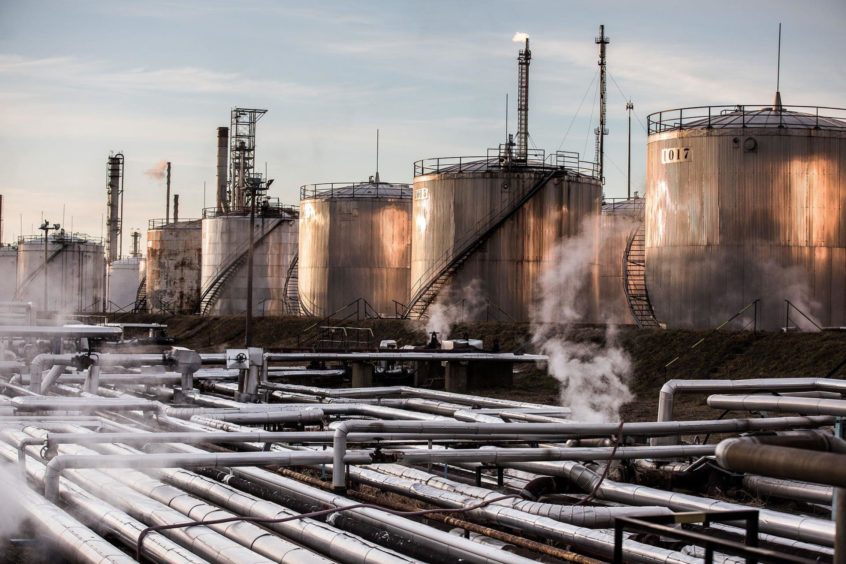
OPEC and its allies headed into a two-day meeting with ministers still seeking a compromise on proposals to delay a production boost, after failing to reach consensus in talks on Sunday night.
The 23-nation coalition led by Saudi Arabia and Russia is debating whether to maintain the output cuts at current levels, deferring the increase scheduled for January. Some members are concerned that global markets remain too fragile to absorb additional barrels — particularly after Libya’s output soared — while others are keen to sell more crude.
Most of the producers who held informal discussions on Sunday supported maintaining the existing curbs into the first quarter, according to delegates who asked not to be identified. Last week, market-watchers were widely anticipating a three-month extension. But the plan didn’t get backing from two of the coalition’s major players: the United Arab Emirates and Kazakhstan, the delegates said.
As the Organization of Petroleum Exporting Countries and its partners prepare for their private sessions — which commence at 2 p.m. Vienna time — the usual negotiating and counter-proposals that precede meetings are in full swing. Besides the central idea of a three-month delay, two months has also been floated, as has the possibility of gradually increasing over a three or four month period, delegates said.
“There is still a broad desire within OPEC+ to balance the market, given additional Libyan supply and softer demand,” said Bill Farren-Price, a director at research firm Enverus. “While there are options on the table, there is no oven-ready deal.”
The UAE hasn’t commented publicly on its stance, and officials from the country say privately that they haven’t decided on a position. Tensions between the emirates and the Saudis, traditionally stalwart partners, have emerged as Abu Dhabi grows impatient to use new production capacity it has built, and launch a regional oil benchmark contract.
Several delegates predicted that OPEC+ would eventually find a compromise that works for everyone, as is usually the case for the group. If that consensus can’t be achieved, the existing agreement allows members to add 1.9 million barrels a day to world markets, potentially derailing the recent rebound in crude prices.
Brent futures are trading near $47 a barrel in London. Crude could fall by about $5 if OPEC+ doesn’t delay the production increase, according to Goldman Sachs Group Inc.
Uncertain Demand –
OPEC+, which pumps more than half the world’s crude, made vast production cuts during the depths of the pandemic to offset a historic collapse in fuel demand. The alliance had planned to ease some of those curbs at the start of 2021, in anticipation of a global economic recovery.
While a breakthrough in vaccines to tackle the coronavirus propelled oil prices to an eight-month high, a resurgence in infections has triggered a new wave of lockdowns and inflicted a fresh blow to fuel consumption. The cartel and the wider industry have downgraded their outlooks for 2021, with a picture thats sharply polarized between recovery in Asia and stagnation in Europe.
Over the past few weeks, leading figures in the OPEC+ alliance such as Saudi Energy Minister Prince Abdulaziz Bin Salman and group president, Algeria’s Abdelmajid Attar, have signaled the producers would adjust the planned supply increase.
An online gathering was hastily convened on Sunday to forge a consensus, at which Russian Deputy Prime Minister Alexander Novak made the case for prolonging the current supply curbs. OPEC+ is collectively halting about 7.7 million barrels of daily output, or about 8% of the global total.
Yet Abu Dhabi withheld its blessing, with Energy Minister Suhail Al-Mazrouei repeating his position that many countries still haven’t implemented the supply cuts they’ve been obligated to make for months, delegates said.
That may have been a pointed reference to the Saudis’ treatment of the UAE during the summer, when Mazrouei was summoned to Riyadh and given a public rebuke for his own overproduction. The country has since delivered the required compensatory curbs, but other laggards like Iraq and Nigeria haven’t.
The Emirates’ frustration flared two weeks ago, when officials signaled privately that they were dissatisfied with the quota assigned to them by OPEC, and were even contemplating leaving the organization in the long term. Iraq and Nigeria have also grumbled about their output limits.
“Saudi Arabia will have to lean hard to get an agreement,” said Mohammad Darwazah, an analyst at research firm Medley Global Advisors LLC. “There have been particularly acute rumblings of dissatisfaction with the status quo from Abu Dhabi.”